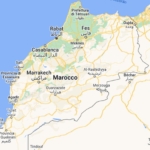This is the fifth part of the series “Athens: the crisis within the crisis” (click here).
In a corner of the Eleonas refugee camp, among the new barracks inhabited by newly arrived refugees, I met a young man from Syria. He shared his personal experience with the human consequences of geopolitics.
A refugee family
Ibrahim came towards me with his little cousin in a trolley. They were curious about me. Ibrahim was a former student who had to flee from his village in northern Syria. Ibrahim had stayed in Pireus Port for a long time before going to the Macedonian border, then staying for a long time by the border fence. I got the impression that he fled from Jihadists. Ibrahim and the family wish to reach Germany. The little girl misses her father, who left Syria three months earlier, and who is waiting for them in Germany.
The little girl wants her Mom, so we walk towards their barrack. Ibrahim delivers her, and we sit down to talk at the stairs. His friends show up, one of them with his little daughter. They tell me about their life in the camp, and I promise to write about it.
Before the war
Ibrahim misses the Syria that existed before the civil war. Then no-one asked if you were a Christian or a Moslem, a Sunni or an Alawite. “Al-arab wahid ashab” his friend says – he does not speak English, but tells in simple Arabic that all Arab-speakers are one people. We should not fight against each other. Another friend of Ibrahim has worked in Nabatieh in South Lebanon. I tell them that, in fact, I am on my way to Lebanon, to celebrate Resurrection and the Orthodox Easter. The young men wish me a good pilgrimage, and ask me to say hi to the Syrians in Beirut. One and half million refugees from Syria are sheltered in Lebanon, alongside four million Lebanese citizens, as well as several million stateless Palestinians.
The conflict back home
As with the Lebanese thirty years earlier, the Syrians have experienced sudden change from cultural pluralism to sectarian war. The diversity used to be exposed by the presence of various churches, mosques and historical monuments. The civil war, by contrast, pits brother against brother, worker against worker. Tactical alliances change swiftly for militias on the ground, while the strategic map shows four coalitions: the government with allies, the rebels spearheaded by Jihadists, the so-called Islamic State in the east, and the Kurdish democratic forces in the north. Here is scarce room for idealism. In sectarian war, you must shoot your neighbour before he shoots you – or get away. The UN has registered 6,6 million internally displaced persons, while 4,8 have fled the country.
The right to seek asylum
After reading the second article in this series, some of the refugees I had met send me an email. They attach photos of their barracks, most of them lacking air condition. In each barrack, several families live under the same tin roof, under the Greek summer sun. Also an employee sends an email, reporting that the electric supply has become more reliable, but that there is a lack of workforce. But most important of all, the refugees fear the deal between Turkey and the EU, about forced return of Syrian refugees.
Amnesty International claims that the EU-Turkey deal violates international human rights law. Syria certainly is unsafe, and Turkey is moving in the same direction with an Islamist president using Jihadists as proxy against secular leftist forces in the Kurdish areas of Turkey and Syria. The Turkish military always was hostile to Amnesty. But when Turkey and the EU made their deal, Amnesty protested against both.
Ibrahim expects to be deported within few days. The girl and her mother are in contact with the girl’s father, Ibrahim’s brother in law. He has obtained permit to stay in Germany, and contacted the German embassy in Athens, asking to reunite with his family. The German embassy told him to wait five months for a reply, but the Greek temporary residence permits for his family last only one month more. The asylum bureaucracy is overloaded – and hasty deportations prevent serious processing of the asylum applications.
Amnesty International has a petition against the EU-Turkey deal (click here).







